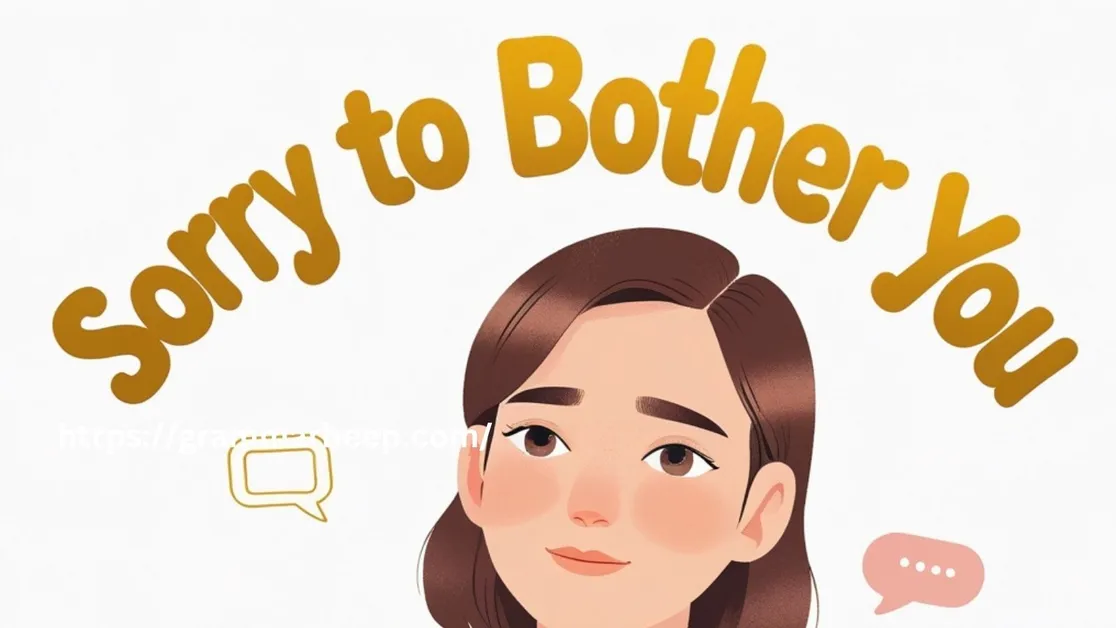20 Other Ways to Say “Sorry to Bother You” isn’t just a list — it’s your toolkit for sounding thoughtful, confident, and professional in every interaction. Too often, people overuse the same phrase and end up sounding robotic or unsure. But a small shift in how you speak can leave a powerful impression.
With these polite interruption phrases and courteous expressions in English, you’ll never feel awkward asking for someone’s time again. These fresh, versatile alternatives help you navigate everything from urgent work chats to casual follow-ups — all while keeping your tone human, warm, and aligned with professional communication etiquette.
Just Wondering If You Had a Moment
This phrase is casual yet respectful and works well in both verbal and written communication. It subtly checks someone’s availability without sounding pushy.
Example Email:
Subject: Quick Touch Base
Hi Rebecca,
Just wondering if you had a moment to chat about the client onboarding update. I’d love to get your input before tomorrow’s team meeting.
Thanks in advance!
Would You Mind If I Jump In?
Perfect for meetings or group conversations, this respectful interjection allows you to contribute without derailing the discussion.
In Conversation:
“Would you mind if I jump in? I think I’ve got a solution to the delivery timeline issue.”
Use this when you’re seeking clarification or offering input on a project during team huddles.
Hope I’m Not Catching You at a Bad Time
This phrase mixes empathy and time-awareness, making it suitable for both personal and professional conversations. It’s a great way to soften an interruption.
Example Email:
Subject: Quick Question About Budget Allocation
Hi Thomas,
Hope I’m not catching you at a bad time. I had a quick question regarding the Q3 numbers and how we’re tracking toward the goals.
Appreciate your time!
Check out this: 19 Other Ways to Say “Welcoming Environment”
When You Have a Minute
This implies patience and flexibility — ideal when you want to minimize disruption but still flag something as important.
Slack Message:
“When you have a minute, could you take a look at the draft proposal? I think it needs your expert touch.”
This approach reflects workplace professionalism while being tactful.
I Know You’re Busy, But…
Acknowledging the other person’s schedule shows you’re mindful and respectful — especially when your request isn’t urgent but still necessary.
Example Email:
Subject: Assistance with the Presentation Slides
Hi Jasmin,
I know you’re busy, but if you could spare five minutes to review the deck, I’d really appreciate your feedback.
Thanks so much!
Could I Steal You for a Second?
This lighthearted yet effective phrase helps keep things friendly, often used when you need help quickly and casually.
In-Person Request:
“Hey Ryan, could I steal you for a second? There’s a glitch in the CRM I think you’d spot right away.”
It’s an example of a quick question alternative that’s informal but clear.
More for you: 21 Other Ways to Say “My Name Is”
Mind If I Interrupt for a Sec?
A polite interruption phrase that shows you understand you’re stepping into someone’s focus. It works well in fast-paced workspaces.
Scenario:
“Mind if I interrupt for a sec? The vendor just called with a shipping update — it might impact the timeline.”
Can I Run Something By You?
Use this when you’re looking for feedback or seeking advice politely. It’s not just about interrupting — it’s about collaboration.
Example Email:
Subject: Feedback on My Draft
Hey Marco,
Can I run something by you real quick? I’m finalizing the report and want to be sure I’m aligning with our KPIs.
Thanks a ton!
Not to Distract You, But…
This phrase shows sensitivity to the other person’s focus while signaling that your matter is relevant or important.
Scenario (Instant Message):
“Not to distract you, but did you hear back from legal yet on the NDA updates?”
It’s one of those phrases for workplace conversation that strikes a balance between awareness and urgency.
Just a Quick Thing
Short, friendly, and to the point — this is great for time-sensitive communication that won’t require much of the other person’s bandwidth.
Email Opener:
“Hey Brian, just a quick thing — do you know if the product walkthrough is happening today or tomorrow?”
If Now’s a Good Time…
This phrase is flexible and respectful — ideal when checking availability before diving in.
Phone Intro:
“Hi Alicia, if now’s a good time, I’d love to ask about the budget changes for next quarter.”
This is part of a professional communication etiquette strategy.
For your interest: 16 Creative Ways to Say “Welcome to the Team”
I’ll Be Brief, I Promise
Sometimes, you just need to get someone’s attention quickly without sounding like you’re about to derail their whole day.
Walk-by Office Example:
“I’ll be brief, I promise — just wanted to confirm if the event date is finalized.”
This phrase taps into business communication tone while still showing urgency.
Before You Go…
Ideal for catching someone as they’re leaving a meeting or ending a conversation — useful when timing is key.
Meeting Exit Example:
“Before you go, quick question — do you need me to loop in marketing for the next sprint?”
I Hate to Interrupt, But…
This one carries a little more weight and signals urgency. It’s best used sparingly when the interruption is truly necessary.
Meeting Scenario:
“I hate to interrupt, but the client’s on the line and needs a decision on the contract clause.”
It’s a good example of expressing urgency respectfully.
Quick Clarification
Perfect when you’re seeking clarification and don’t want to bog down a discussion.
Email Example:
Subject: Quick Clarification on Budget
Hi Leo,
Quick clarification — are the final numbers in for last quarter, or are we still waiting on purchasing?
Thanks!
This is one of those email etiquette phrases that gets straight to the point.
Do You Have a Moment to Chat?
This works well in both live conversation and emails. It’s friendly, clear, and still shows courteous expressions in English.
Email:
“Hi Sam, do you have a moment to chat later today about our role in the partner campaign?”
I Won’t Take Much of Your Time
Use this when you need to reassure someone that your interruption is minor and short.
Call Opener:
“Hey Jen, I won’t take much of your time — I just wanted to touch base on the revised deadline.”
It’s a respectful choice in interrupting politely in meetings or during focused work hours.
Pardon the Disruption
A slightly more formal phrase that still carries a gentle tone. Great in professional environments.
Office Knock Scenario:
“Pardon the disruption — I just need a signature on the compliance form.”
This falls under formal interruption phrases and is a good professional apology alternative.
You might also like: 22 Other Ways to Say “In Conclusion”
Couldn’t This Wait — Unless It’s Important?
Used strategically, this phrase can also reflect respectful interjection — asking yourself before speaking.
But when flipped:
“Couldn’t this wait — unless it’s important?” can be the exact response someone gives if the timing is off.
Instead, reframe:
“Hey Ava, I know this could probably wait, but I believe it ties directly into today’s priorities.”
At Your Convenience
This phrase gives the listener control. It’s perfect when the matter isn’t urgent but still needs attention.
Email Example:
Subject: Brief Catch-Up Request
Hi Daniel,
At your convenience, I’d love to schedule 10 minutes to align on the hiring plan.
Let me know when’s best.
This is a gold standard among ways to minimize disruption.
Synonym of Other Ways to Say “Sorry to Bother You”
| Alternative Phrase | Best Use Case |
|---|---|
| Just wondering if you had a moment | Casual, friendly message |
| Would you mind if I jump in? | Group discussions or meetings |
| Hope I’m not catching you at a bad time | Polite email or call introduction |
| When you have a minute | Slack or quick text |
| I know you’re busy, but… | Acknowledging inconvenience |
| Could I steal you for a second? | Informal workplace chat |
| Mind if I interrupt for a sec? | Brief updates in real-time |
| Can I run something by you? | Seeking advice politely |
| Not to distract you, but… | Soft interruption |
| Just a quick thing | Time-sensitive request |
| If now’s a good time… | Asking for permission to speak |
| I’ll be brief, I promise | Reassuring tone during interruption |
| Before you go… | Catching someone before they leave |
| I hate to interrupt, but… | Urgent matters in meetings |
| Quick clarification | Seeking clarification phrases |
| Do you have a moment to chat? | Requesting attention |
| I won’t take much of your time | Softening language |
| Pardon the disruption | Formal or professional tone |
| I know this could wait, but… | Time-sensitive communication phrases |
| At your convenience | Minimizing imposition |
FAQs
Can these phrases be used in both emails and face-to-face conversations?
Yes, most of these expressions work well in both written and spoken communication, depending on your tone and context.
Are these alternatives suitable for international audiences?
Absolutely — they use clear, respectful language that fits well within global professional communication etiquette.
Which phrases work best for urgent requests?
Phrases like “I hate to interrupt, but…” or “Quick clarification” are perfect for time-sensitive communication.
Should I still apologize if I interrupt someone?
Only when necessary — using these respectful interruption examples often removes the need for a formal apology.
Are these expressions formal or informal?
They range from casual to formal, making it easy to match the communication tone to your audience.
Conclusion
20 Other Ways to Say “Sorry to Bother You” gives you more than just variety — it hands you confidence in communication. Whether you’re messaging a coworker or emailing your boss, these expressions let you speak up without sounding hesitant. Each one helps you practice better email etiquette phrases and business communication tone.
Use them to build trust, keep things respectful, and sound more natural. With the right words, a polite interruption becomes an opportunity — not a mistake.

Zoey Alba is an experienced blogger and language enthusiast with a passion for helping readers master the art of grammar. With years of expertise in writing, editing, and content creation, Zoey shares practical tips and insightful advice to make grammar accessible for all. When she’s not writing, Zoey enjoys reading, learning new languages, and inspiring others to write with confidence.
